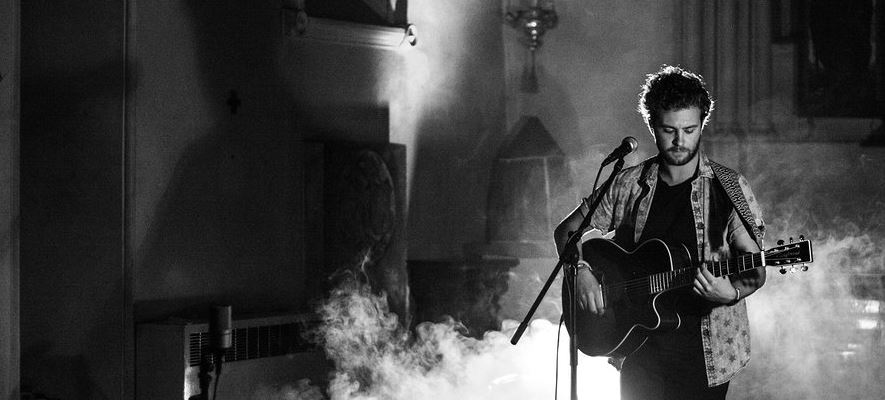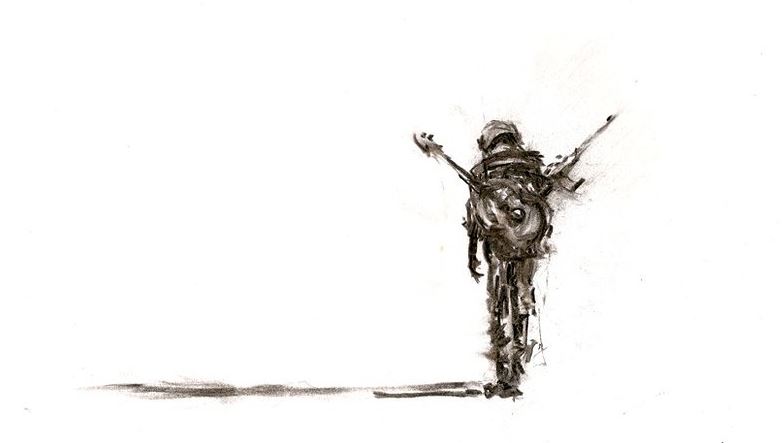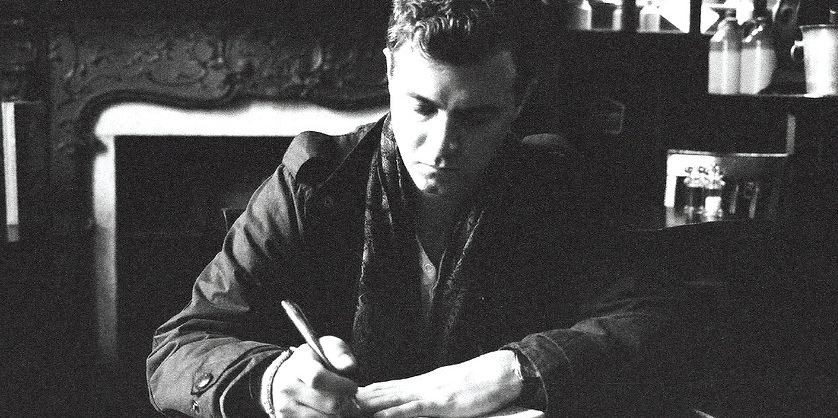Local Talent: Antony Raine
Since studying at Warwick, Antony Raine has been a busy man indeed. Having joined the army and served in Afghanistan following his graduation, the former Politics and French student was a latecomer of sorts to his new role as singer-songwriter. His debut EP, Farewell to Arms, blends his military experiences with the wistful poetry of Americana to form a warm, insightful collection of songs that list Springsteen and Hemingway among their influences. Currently working on growing his back catalogue of tracks, Boar Music caught up with the London-based troubadour to see how he’s been getting on since his university days.
Boar Music: Hi Antony, what are you up to at the moment?
Antony Raine: I’ve just released my first EP, and I’m about to go and record the next one in a few weeks time. I had quite a big launch gig in a place called St. Pancras Old Church which was sold out for more than 150 people, which was great. I’ve had some radio play in Yorkshire, on local BBC radio and on 6 Music a couple of weeks ago. I’m steadily trying to expand on what I’m doing, and I’m hoping to get on the back of a tour in the early new year.
BM: What can you tell us about Farewell to Arms?
AR: It’s a collection of four songs I wrote when I was in the army. The title is a reference to Hemingway; I really enjoy his writing, particularly the way he used exotic locations to bring out aspects of his story. The songs aren’t all about me, but they’re a reflection of my experiences away from home and out on tour in Afghanistan, while some of the songs have a political slant to them. Along with the artwork [depicting a soldier carrying a guitar on his back], I wanted it all to tie in as my farewell to the army, which was a very big part of my life for a number of years.
BM: Was your time in the army a turning point for your music?
AR: Yeah, it was. I only really started playing when I was at Warwick, actually, where it was always a more personal thing. At that time, I taught myself and stuck to playing in my room, while my aim was always to become a soldier. As time went on, though, I was writing lots and it became clear while I was in Afghanistan that I really wanted to write music. When you’re in an environment like that, certain things become clear. I made a conscious decision that I was going to give it a go when I got back – which is what I’m doing now!
BM: How do you remember your time at Warwick?
AR: I had quite a small but close-knit group of mates at Warwick, and they’re still some of my closest friends today. I studied Politics and French, and I spent a year in Grenoble doing the whole Erasmus thing. That experience was crucial to my writing as well, as it had just been a hobby up to that point. I was actually meant to go to Paris, but for whatever reason the Politics department had a bit of a cock-up and left me off the list; the only thing left was Grenoble. I was pissed off at first, but it actually turned out to be an amazing year. I had a great time at university and I was a member of the hockey club, so I feel like I made the most of my time there.
Adjusting to life after the army has been really challenging. It isn’t just a job – it’s a way of life.”
BM: How did you find balancing music and work while this was going on?
AR: I did find it hard to actually go and play at SU nights like Battle of the Bands – do they still have Battle of the Bands?
BM: Yeah, that’s still going.
AR: Yeah, there used to be that sort of stuff but I was always too shy to take part. It sounds ridiculous, but I was always playing a lot of sport and I found it hard to develop the courage to go and perform. I really wish I did now, because I’d probably be a lot more accomplished today. I didn’t start playing live in a proper setting until I was in the army, when I did the odd gig here and there. It’s difficult because you’ve got to study and you’ve got all these other things going on, but I wish I would have done that because it would have given me more confidence early on.
BM: Your music’s been described as Americana – is that something you’d agree with?
AR: Yeah, a couple of reviews have called it “British Americana”. I’ve never described it like that myself, but I can see that it’s verging on that. I never set out to write Americana – it just seemed like a natural progression.
BM: How have you found it adjusting to life after the army?
AR: It’s been really challenging. The army isn’t just a job – it’s a way of life, and leaving after serving for years isn’t the easiest thing to do. But now I feel like I’m adjusting quite quickly, and it helps that a lot of my army friends have also left and relocated to London. You have to stay quite disciplined as an artist, especially when you don’t have a band that you perform with – you have to be your own motivator. The self-discipline the army’s given me has helped; when somebody gives you a bad review, you just have to keep going. While it’s been difficult, I definitely don’t enjoy wearing uniform any more, and I definitely like being my own boss. It’s great to have that freedom.
BM: What are you looking to do with your music now?
AR: I’ve pretty much got the third EP written, so I’ve got quite a good catalogue of songs now. I’m probably going to be releasing a live EP from the launch gig I did a couple of months ago – that’ll come out at Christmas. The third EP, which I’ll be recording in a couple of weeks, will come out in March. The aim is to create this body of work that demonstrates versatility and creates some momentum so I can get picked up by a big label.
BM: Would you consider coming to perform at Warwick?
AR: I’d love to come back to Warwick and do a gig there. I remember seeing Ray LaMontagne when I was studying there; that’s when I really started thinking about writing my own stuff. It sowed a little seed very early on – it was absolutely amazing.
To find out more about Antony Raine’s music, find him on Facebook, follow him on Twitter, or visit his website at www.antonyraine.com.



Comments (1)